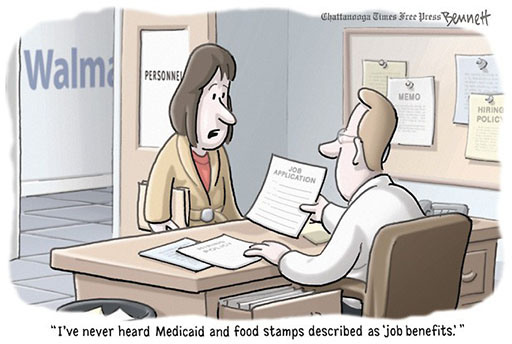This One Cartoon Brilliantly Summarizes Working At Walmart

By:
Although many companies already pay their workers a living wage, there are still major corporations whose employees make so little that they rely on public assistance to get by. This phenomenon is often described as a form of corporate welfare, and companies such as McDonald's and Walmart are often cited as major recipients.
In one simple square, a comic by Clay Bennett from the Chattanooga Times Free Press criticizes Walmart for exactly this: Medicaid and food stamps are depicted as "job benefits" because so many Walmart employees are eligible for these forms of public assistance given their meager wages.
 Clay Bennett, Chattanooga Times Free Press - khn.org
Clay Bennett, Chattanooga Times Free Press - khn.org
Walmart's low wages (notwithstanding a recent increase to $10 per hour) mean that many of the company's employees qualify for assistance programs such as the Supplemental Nutrition Assistance Program (SNAP), Medicaid, and subsidized housing -- which are funded by taxpayer dollars.
In 2014, the non-profit organization Americans for Tax Fairness released a report estimating that Walmart receives $6.2 billion per year in government subsidies as a result of their employees drawing on public funds in order to make ends meet. That estimate was based on a report from the Democratic Staff on the U.S. House Committee on Education and the Workforce, which, using Wisconin's Medicaid data, "estimates that a single 300-person Wal-Mart Supercenter store in Wisconsin likely costs taxpayers at least $904,542 per year and could cost taxpayers up to $1,744,590 per year–about $5,815 per employee."
And there's a simple solution: raise wages, and as ATTN: has written before, increased wages will only cost consumers 1.1 percent more at Walmart.
This is an issue in the fast food industry as well.
Walmart is not the only company whose low wages are subsidized by taxpayer dollars. Fast-food employees also frequently rely on public assistance, which costs the taxpayers $7 billion, according to a report from the Center for Labor Research and Education at the University of California, Berkeley in 2013.
An argument for raising the minimum wage.
The issue of raising the minimum wage has been the subject of controversy and social activism in 2015; proponents for a higher living wage, such as the Fight for $15, saw a victory in Los Angeles and are on the precipice of a win for fast-food workers in New York.
As ATTN: has highlighted before, the current federal minimum wage is $7.25 per hour; and with a rising cost of living and inflation, it is no longer a living wage.
